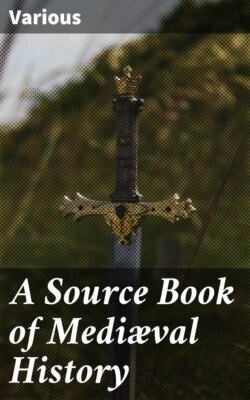Читать книгу A Source Book of Mediæval History - Various - Страница 3
На сайте Литреса книга снята с продажи.
PREFACE
ОглавлениеTable of Contents
This book has been prepared in consequence of a conviction, derived from some years of teaching experience, (1) that sources, of proper kind and in carefully regulated amount, can profitably be made use of by teachers and students of history in elementary college classes, in academies and preparatory schools, and in the more advanced years of the average high school, and (2) that for mediæval history there exists no published collection which is clearly adapted to practical conditions of work in such classes and schools.
It has seemed to me that a source book designed to meet the requirements of teachers and classes in the better grade of secondary schools, and perhaps in the freshman year of college work, ought to comprise certain distinctive features, first, with respect to the character of the selections presented, and, secondly, in regard to general arrangement and accompanying explanatory matter. In the choice of extracts I have sought to be guided by the following considerations: (1) that in all cases the materials presented should be of real value, either for the historical information contained in them or for the more or less indirect light they throw upon mediæval life or conditions; (2) that, for the sake of younger students, a relatively large proportion of narrative (annals, chronicles, and biography) be introduced and the purely documentary material be slightly subordinated; (3) that, despite this principle, documents of vital importance, such as Magna Charta and Unam Sanctam, which cannot be ignored in even the most hasty or elementary study, be presented with some fulness; and (4) that, in general, the rule should be to give longer passages from fewer sources, rather than more fragmentary ones from a wider range.
With respect to the manner of presenting the selections, I have sought: (1) to offer careful translations—some made afresh from the printed originals, others adapted from good translations already available—but with as much simplification and modernization of language as close adherence to the sense will permit. Literal, or nearly literal, translations are obviously desirable for maturer students, but, because of the involved character of mediæval writings, are rarely readable, and are as a rule positively repellent to the young mind; (2) to provide each selection, or group of selections, with an introductory explanation, containing the historical setting of the extract, with perhaps some comment on its general significance, and also a brief sketch of the writer, particularly when he is an authority of exceptional importance, as Einhard, Joinville, or Froissart; and (3) to supply, in foot-notes, somewhat detailed aid to the understanding of obscure allusions, omitted passages, and especially place names and technical terms.
For permission to reprint various translations, occasionally verbatim but usually in adapted form, I am under obligation to the following: Messrs. Houghton, Mifflin and Co., publishers of Miss Henry's translation of Dante's De Monarchia; Messrs. Henry Holt and Co., publishers of Lee's Source Book of English History; Messrs. Ginn and Co., publishers of Robinson's Readings in European History; Messrs. Charles Scribner's Sons, publishers of Thatcher and McNeal's Source Book for Mediæval History; Messrs. G. P. Putnam's Sons, publishers of Robinson and Rolfe's Petrarch; and Professor W. E. Lingelbach, of the University of Pennsylvania, representing the University of Pennsylvania Translations and Reprints from the Original Sources of European History.
In the preparation of the book I have received invaluable assistance from numerous persons, among whom the following, at least, should be named: Professor Samuel B. Harding, of the University of Indiana, who read the entire work in manuscript and has followed its progress from the first with discerning criticism; Professor Charles H. Haskins, of Harvard University, who has read most of the proof-sheets, and whose scholarship and intimate acquaintance with the problems of history teaching have contributed a larger proportion of whatever merits the book possesses than I dare attempt to reckon up; and Professors Charles Gross and Ephraim Emerton, likewise of Harvard, whose instruction and counsel have helped me over many hard places.
The final word must be reserved for my wife, who, as careful amanuensis, has shared the burden of a not altogether easy task.
FREDERIC AUSTIN OGG.
Cambridge, Mass.
